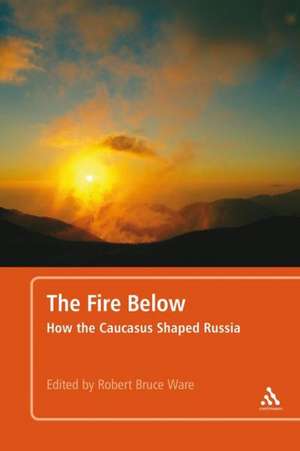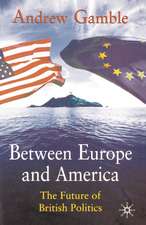The Fire Below: How the Caucasus Shaped Russia
Editat de Dr. Robert Bruce Wareen Limba Engleză Paperback – 3 iul 2013
| Toate formatele și edițiile | Preț | Express |
|---|---|---|
| Paperback (1) | 241.42 lei 43-57 zile | |
| Bloomsbury Publishing – 3 iul 2013 | 241.42 lei 43-57 zile | |
| Hardback (1) | 717.79 lei 43-57 zile | |
| Bloomsbury Publishing – 3 iul 2013 | 717.79 lei 43-57 zile |
Preț: 241.42 lei
Preț vechi: 307.65 lei
-22% Nou
Puncte Express: 362
Preț estimativ în valută:
46.21€ • 50.21$ • 38.84£
46.21€ • 50.21$ • 38.84£
Carte tipărită la comandă
Livrare economică 21 aprilie-05 mai
Preluare comenzi: 021 569.72.76
Specificații
ISBN-13: 9781441107930
ISBN-10: 1441107932
Pagini: 360
Dimensiuni: 152 x 229 x 36 mm
Greutate: 0.54 kg
Editura: Bloomsbury Publishing
Colecția Bloomsbury Academic
Locul publicării:New York, United States
ISBN-10: 1441107932
Pagini: 360
Dimensiuni: 152 x 229 x 36 mm
Greutate: 0.54 kg
Editura: Bloomsbury Publishing
Colecția Bloomsbury Academic
Locul publicării:New York, United States
Caracteristici
Leading scholars and practitioners analyze the relationship between the Caucasus and the Russian Federation.
Notă biografică
Since completing his doctorate at Oxford University, Robert Bruce Ware has conducted field work in the North Caucasus, contributing numerous articles on the region. He is the co-author of Dagestan: Russian Hegemony and Islamic Resistance in the North Caucascus. His publications on philosophical issues include his book on Hegel. His popular commentaries have appeared in major publications around the world. He serves as a Professor of Philosophy at Southern Illinois University Edwardsville, USA.
Cuprins
1. Introduction (Robert Bruce Ware)Part One: Caucasian Causation2. Enter the Memes (Patrick Armstrong)3. A Thorn by Any Other Name: Georgian Origins of Russia's Caucasian Crises (Patrick Armstrong) 3. Caucasian Crescent: Russia's Islamic Policies and its Responses to Radicalization (Domitilla Sagramoso and Akhmet Yarlykapov)4. War in the Caucasus: Moving the Russian Military into the Twenty-first Century (Lt. Col. Robert W. Schaefer and 1LT Andrei Doohovskoy)Part Two: Caucasian Consequences5. Russia's Canary in the North Caucasus' Mine: Stavropol'skii kai (Andrew Foxall)6. Blowback? Chechnya and the Challenges of Russian Politics (Richard Sakwa)7. Preparations for the Sochi Olympics (Walter Richmond)Part Three: Caucasian Crosscurrents8. Islam and Orthodox Christianity in the Caucasus: From Antagonism to Partnership (Nicolai N. Petro)9. The Northeastern Caucasus: Drifting Away from Russia (Anna Matveeva)10. Conclusion: How Has the Caucasus Shaped Russia? (Robert Bruce Ware)Appendix: A Case Study of Western Memes: The Pussy Riot Conviction (Nicolai N. Petro)Index
Recenzii
Since the fall of the Soviet Union no region has grown to occupy a more dramatic role in Western analyses and concerns regarding Russia than the Caucasus. Located at the boundary of Europe, Asia, and the Middle East the Caucasus is a complex, mini-continent of three sovereign states and seven "republics," the scene of seven wars since 1988, a region of oil and pipelines, a zone of endemic turmoil where Islam, Orthodox Christianity and secularism overlay old rivalries and grievances, and, to set the entire region on the world stage, the planned site of the 2014 Sochi Olympics. The present book brings together eleven experts on this complex, non-Slavic region, who examine in novel and refreshing ways the effects the Caucasus is having upon the military, political, economic, and social dimensions of Russia as a whole. Several years in preparation this volume cuts through the miasma of romantic or exotic misconceptions that color the view of this region, both on Moscow's part and that of the West. Chapters argue persuasively that not only has the Caucasus decisively affected the evolution of Russia over the past twenty odd years, but that it continues to offer new models of Russian control while at the same time presenting a picture of growing estrangement and increasing de facto autonomy. One chapter, dealing with preparation for the Sochi Olympics, paints a picture of such extensive corruption that the entire economy of Russia is being adversely affected, not to mention the swirl of grievances flying around the issue of the Circassians, who will have been driven from Sochi, their "capital," 150 years ago on the advent of the games. This book will be vital to those who are interested not only in politics and the dynamics of Russia, but in Olympic sports as well. After reading this volume Russia, the Caucasus, and even the Olympics will never seem quite the same again.
This volume, put together by...a leading specialist on Dagestan and the North Caucasus, contributes new perspectives
This volume, put together by...a leading specialist on Dagestan and the North Caucasus, contributes new perspectives














